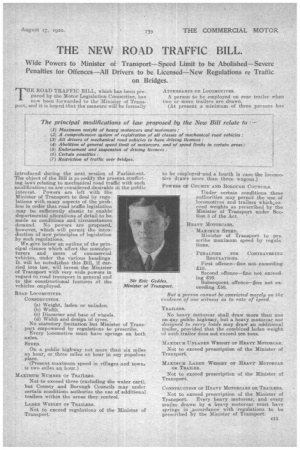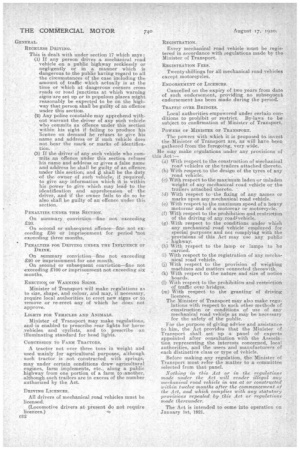THE NEW ROAD TRAFFIC BILL.
Page 13

Page 14

If you've noticed an error in this article please click here to report it so we can fix it.
Wide Powers to Minister of Transport—Speed Limit to be Abolished—Severe Penalties for Offences—All Drivers to be Licensed—New Regulations re Traffic
on Bridges.
THE ROAD TRAFFIC BILL, which has been pre. pared by the Motor Legislation Committee, has . now been forwarded to the Minister of Transport, and it is hoped that the measure will be formally
introduced during the next session of Parliament. The object of the Bill is to codify the present conflicting laws relating to mechanical road traffic with such modifications as are considered desirable in the public interest. Powers are left with the Minister of Transport to deal by regulations with many aspects of the• problem in order that road traffic legislatioa may be sufficiently elastic to enable departmental alterations of detail to be made as conditions and circumstances -demand. No powers are proposed, however, which will permit the introduction of new principles of legislation by such regulations.
We give below an outline of the principal clauses which affect the manufacturers and users of commercial Vehicles, under the various headings It will be note&that this Bill, if carried into law, will invest the Minister of Transport with very wide powers in regard to road transport in general and to the constructional features Of the vehicles employed.
ROAD LOCOMOTIVES. CONSTRUCTION.
(a) Weight, laden or unladen.
(b) Width.
(c) Diameter and base of wheels.
(d) Width and design of tyres. No statutory limitation but Minister of Transport empowered by regulations to prescribe. Every locomotive must have springs on both axles.
SPEED.
On a public highway not more than six miles an hour, or three miles an hour in any populous place.
(Present maximum speed in villages and towns is two miles an hour.) MAXIMUM NUMBER OF TRAILFAS NOt to exceed three (excluding the water cart), but County and Borough Councils may under certain conditions authorize the use of additional trailers within the areas they control.
LADEN WEIGHT OF TRAILERS.
Not to exceed regulations of the Minister of Transport. ATTENDANTS ON LOCOMOTIVES.
A person to be employed on rear trailer when two or more trailers are drawn.
(At present a minimumof three persons has to be employed'and a fourth in case the locomotive draws more than three wagons.) POWERS OF COUNTY AND BOROUGH COUNCILS.
Under certain conditions these authorities may permit the use of locomotives and trailers which; ex. coed weights as prescribed by -the Minister of Transport under Section 5 of the Act.
HEAVY MOTORCARS.
MAXIMUM SPEED.
Minister of Transport to pre scribe maximum speed by regula. tians.
PENALTIES FOR CONTRAVENING REGULATIONS.
First offence—fine not exceeding 210.
Second offence—fixe not exceeding 220.
Subsequent offence—fine not exceeding 250.
But a person cannot be convicted merely on the evidence of one witness as to rate of speed.
TRAILERS.
No heavy motorcar shall draw more than one on any public highway, but a heavy motorcar not design-ed to carry loads may draw an additional trailer, provided that the combined laden weight of such trailer does not exceed ten tons.
MAXIMUM UNLADEN WEIGHT OF HEAVY MOTORCAR.
Not to exceed prescription of the Minister of Transport.
MAXIMUM LADEN WEIGHT OF HEAVY MOTORCAR OR TRAILER.
Not to exceed prescription of the Minister of Transport.
CONSTRUCTION OF HEAVY MOTORCARS OR TRAILERS.
Not to exceed prescription of the Minister of Transport. Every heavy motorcar, and every trailer drawn by a heavy motorcar must have springs in accordance with 'regulations to be prescribed by the Minister of Transport.
GENERAL.
RECKLESS DRIVING.
This is dealt with under section 17 which says (1) If any person drives a, mechanical road vehicle on a public highway recklessly or negligently or in a manner which is 'dangerous to the public having regard to all the circumstances of the case including the amount of traffic which actually is at the time or which at dangerous corners cross roads or road junctions at which warning signs are set up or in populous places might reasonably be expected to be on the highway that person shall be guilty of an offence under this section.
(2) Any police constable may apprehend without warrant the driver of any such vehicle who commits an Offence under this section within his sight if failing to produce his licence on demand he retuses to give his name and address or if such vehicle does not bear the mark or marks of identification.
(3) If the driver of any such vehicle who commits. an offence under this section refuses his name and address or gives a false name and address he shall be guilty of an offence under this seetion, and it shall be the duty of the owner of such vehicle, if required, to give any information which it is within his power to give which may lead to the identification and apprehension of the driver, and if the owner fails to do so he also shall be guilty of an offence under this section.
PENALTIES UNDER THIS SECTION.
On summary. conviction—fine not exceeding £20.
On second or subsequent offence—fine not exceeding £50 ot imprisonment for period 'not exceeding three months.
PENALTIES FOR DRIVING UNDER TUE INFLUENCE OF DRINK.
On summary conviction—fine not exceeding .E20 or imprisonment for one month, , On second or subsequent conviction—fine not exceeding .R100 or imprisonment not exceeding six months.
ERECTION OF WARNING SIGNS.
Minister of Transport will make regulations as to size, shape, and colour, and may, if necessary, require local authorities to erect new signs or to remove or re-erect any of which he does not approve.
LIGHTS FOR VEHICLES AND ANIMALS.
Minister of Transport may make regulations, and is enabled to prescribe rear lights for horse _vehicles and cyclists, and to prescribe an illuminating standard for head lights.
CONCESS/ON TO FARM TRACTORS.
A tractor not over three tons in weight and used mainly for •agricultural purposes, although such tractor is not constructed with springs, may under certain conditions draw agricultural engines, farm implements, etc.' along a public highway from one portion of a farm to another, although such trailers are in excess of the number authorized by the Act.
Divnrn LicENcEs.
All drivers of mechanical road vehicles must be licensed.
(Locomotive drivers atpresent do not require licences.)
n19.
REGisTRATiow.
Every mechanical road vehicle must be registered in accordance with regulations made by the Minister of Transport.
REGISTRAtION FEES.
Twentyshillings for all mechanical road vehicles except motorcycles..
ENDORSEMENT OF LICENCES.
Cancelled on the expiry of two years from date of such endorsement,, providing no subsequent endorsement has been made during the period; TRAFFIC OVER BRIDGES.
Local authorities empowered under certain conditions to prohibit or restrict. By-laws to be subject to confirmation of Minister of Transport.
POWERS OF MINISTER Or TRANSPORT.
The powers with which it is proposed to invest the Minister of Transport are, as will have been gathered from-the foregoing, very wide. •
He may make regulations under any provons of this Act:— (a) With respect to the construction of mechanical road vehicles or the trailers attached thereto.
(b) With respect to the design of -the tyres of any road vehicle.
(c) With respect to the maximum laden or unladen weight of any mechanical road vehicle or the trailers attached thereto.
(d) With respect to -the fixing of any names or marks upon any mechanical road vehicle.
(e) With respect to the maximum speed of a heavy motorcar and of a motorcar or motorcycle.
(f) With respect to the prohibition and restriction of the driving of any roachlvehiele.
(g) With respect to the cOnditions under which any mechanical road vehicle employed for special purposes and not complying with the provisions of this Act may use any public highway. (h) With respect to the lamp or lamps to be carried.
(i) With respect to the registration of any media.. nical road vehicle.
(j) With respect to the provision of weighing machines and matters connected therewith.
(k) With respect to the nature and size of notice hoards. (I) With respect to the prohibition and restriction of traffic over bridges. (m) With respect to the granting of driving licences.
The Minister of Transport may also make regulations with respect to such other methods of construction or conditions of use of any mechanical road vehicle as may be necessary for the safety of the public.
For the purpose of giving advice and assistance to him, the Act provides that the Minister of Tra-n sportshall sot up a panel of experts a.ppointed after consultation with the Association representing the interests concerned, local authorities, and the users and manufacturers of each distinctive class or type of Vehicle.
Before making any regulation, the 'Minister of Transport must refer the matter to -a committee elected from that panel.
Nothing in this Act or in the regulations made under the Act will render illegal any mechanical road vehicle in use at or constructed within twelve months after the commencement of the Act, and which complies with any statutory provisions repealed .by. this Act or regulations made thereunder.
The Act is intended to eorne into operation On January 1st, 1921.




























